Unit 4 What's the best movie theater? Section A 1a-3b 知识点串讲课件(共16张PPT)
文档属性
| 名称 | Unit 4 What's the best movie theater? Section A 1a-3b 知识点串讲课件(共16张PPT) |  | |
| 格式 | zip | ||
| 文件大小 | 389.5KB | ||
| 资源类型 | 教案 | ||
| 版本资源 | 人教新目标(Go for it)版 | ||
| 科目 | 英语 | ||
| 更新时间 | 2022-10-10 15:29:10 | ||
图片预览

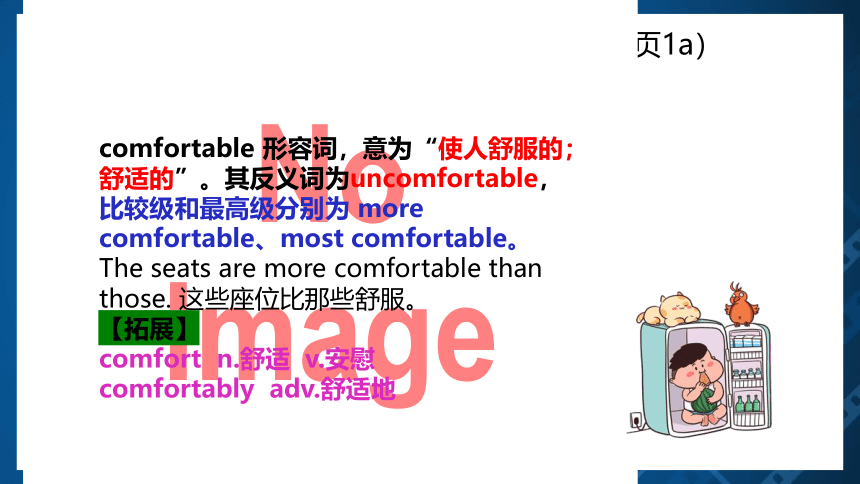
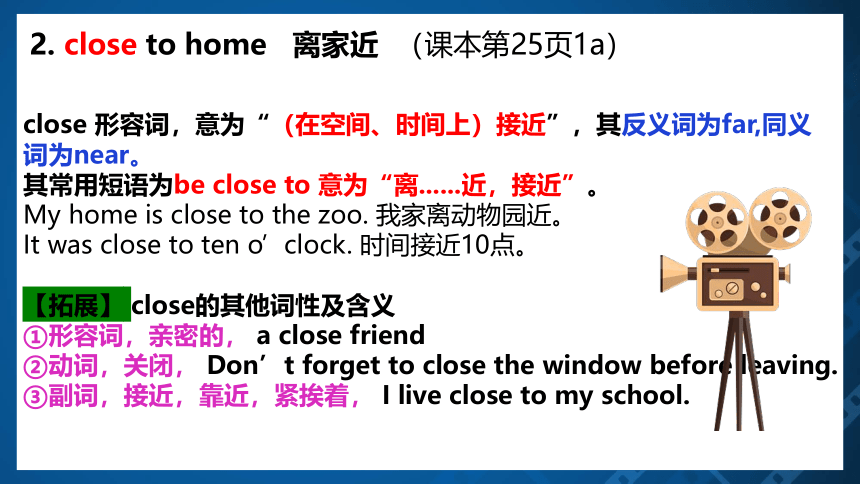
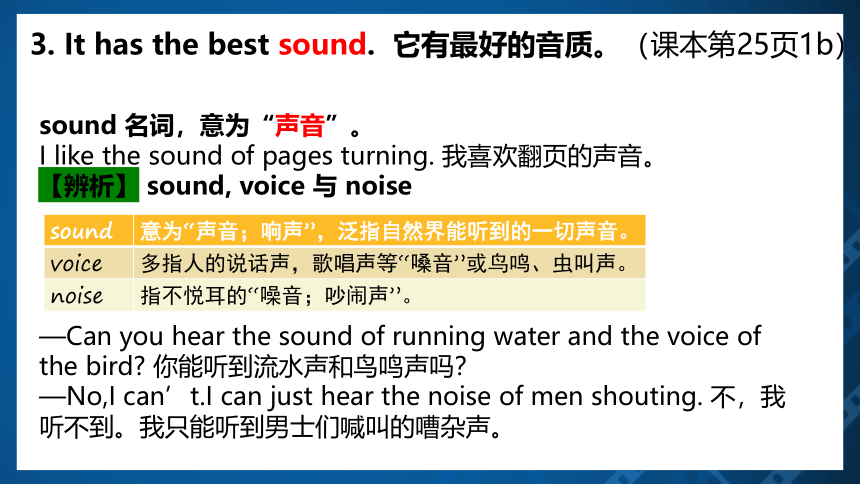
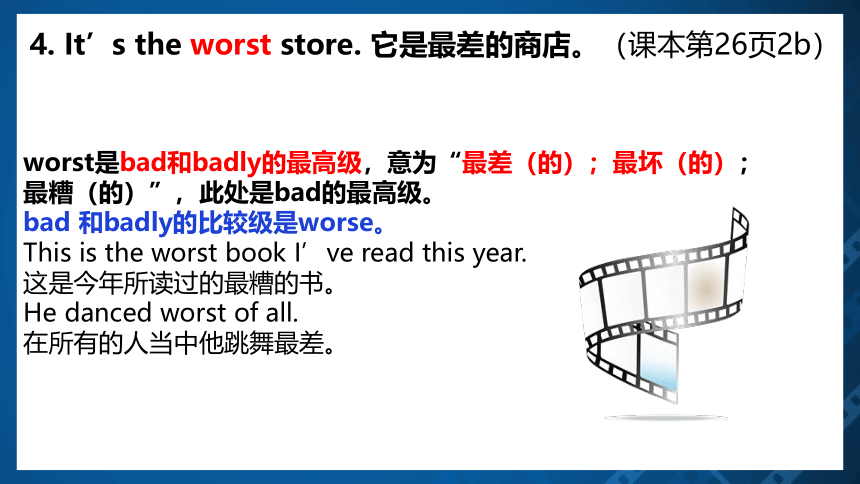
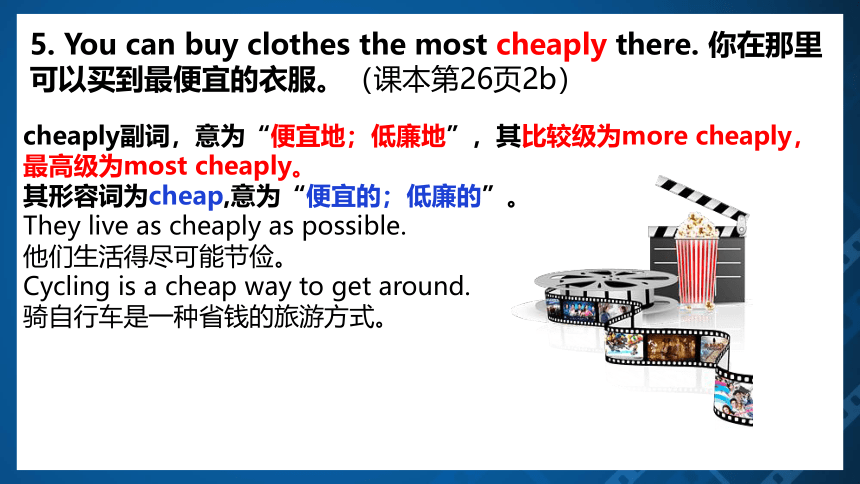
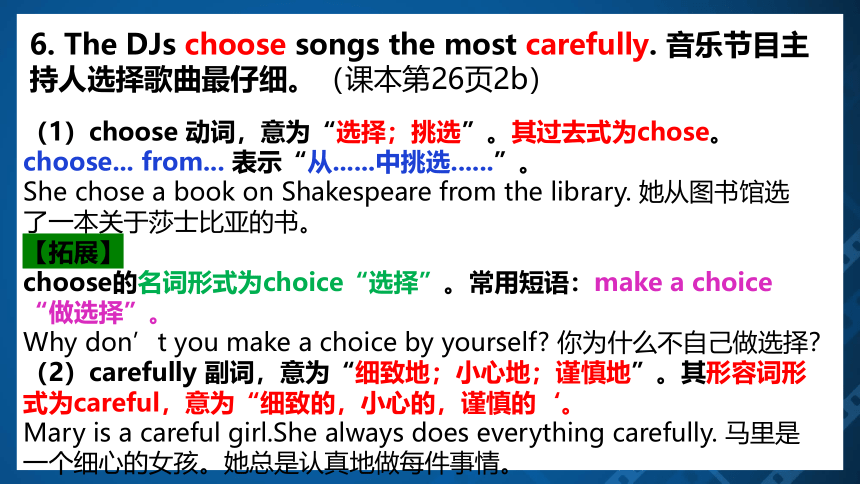
文档简介
(共16张PPT)
Section A 1a-3b知识点串讲
Unit4 What’s the best movie theater
1. comfortable seats 舒适的座位(课本第25页1a)
comfortable 形容词,意为“使人舒服的;舒适的”。其反义词为uncomfortable,比较级和最高级分别为 more comfortable、most comfortable。
The seats are more comfortable than those. 这些座位比那些舒服。
【拓展】
comfort n.舒适 v.安慰
comfortably adv.舒适地
2. close to home 离家近 (课本第25页1a)
close 形容词,意为“(在空间、时间上)接近”,其反义词为far,同义词为near。
其常用短语为be close to 意为“离......近,接近”。
My home is close to the zoo. 我家离动物园近。
It was close to ten o’clock. 时间接近10点。
【拓展】 close的其他词性及含义
①形容词,亲密的, a close friend
②动词,关闭, Don’t forget to close the window before leaving.
③副词,接近,靠近,紧挨着, I live close to my school.
3. It has the best sound. 它有最好的音质。(课本第25页1b)
sound 名词,意为“声音”。
I like the sound of pages turning. 我喜欢翻页的声音。
【辨析】 sound, voice 与 noise
—Can you hear the sound of running water and the voice of the bird 你能听到流水声和鸟鸣声吗?
—No,I can’t.I can just hear the noise of men shouting. 不,我听不到。我只能听到男士们喊叫的嘈杂声。
sound 意为“声音;响声”,泛指自然界能听到的一切声音。
voice 多指人的说话声,歌唱声等“嗓音”或鸟鸣、虫叫声。
noise 指不悦耳的“噪音;吵闹声”。
4. It’s the worst store. 它是最差的商店。(课本第26页2b)
worst是bad和badly的最高级,意为“最差(的);最坏(的);
最糟(的)”,此处是bad的最高级。
bad 和badly的比较级是worse。
This is the worst book I’ve read this year.
这是今年所读过的最糟的书。
He danced worst of all.
在所有的人当中他跳舞最差。
5. You can buy clothes the most cheaply there. 你在那里可以买到最便宜的衣服。(课本第26页2b)
cheaply副词,意为“便宜地;低廉地”,其比较级为more cheaply,最高级为most cheaply。
其形容词为cheap,意为“便宜的;低廉的”。
They live as cheaply as possible.
他们生活得尽可能节俭。
Cycling is a cheap way to get around.
骑自行车是一种省钱的旅游方式。
6. The DJs choose songs the most carefully. 音乐节目主持人选择歌曲最仔细。(课本第26页2b)
(1)choose 动词,意为“选择;挑选”。其过去式为chose。choose... from... 表示“从......中挑选......”。
She chose a book on Shakespeare from the library. 她从图书馆选了一本关于莎士比亚的书。
【拓展】
choose的名词形式为choice“选择”。常用短语:make a choice “做选择”。
Why don’t you make a choice by yourself 你为什么不自己做选择?
(2)carefully 副词,意为“细致地;小心地;谨慎地”。其形容词形式为careful,意为“细致的,小心的,谨慎的‘。
Mary is a careful girl.She always does everything carefully. 马里是一个细心的女孩。她总是认真地做每件事情。
7. Can I ask you some questions 我可以问你一些问题吗? (课本第26页2c)
(1)“Can I... ”常用来表示征求对方的许可,在比较正式的文体或比较客气的场合中Can常用May来代替。其常见答语为:
肯定答语:Sure./Certainly./Of course you can.
否定答语:Sorry,you can’t.
—Can I have a look at your photos,please 请问我可以看看你的照片吗?
—Sure. 当然可以。
(2)some 形容词,意为“一些,若干,几个”。some还可做代词,意为“有些人,有些事”。
Some of his jokes were very interesting. 他的有些玩笑非常有趣。
【辨析】 some 与 any
、
There is some water in the cup. 杯子里有一些水。
Would you like some water 你想要些水吗?
He is taller than any other student. 他比任何一个学生都高。
some 常用于肯定句中,修饰不可数名词或可数名词复数,但在向对方提出请求、建议或希望得到对方的肯定回答的疑问句中,用some而不用any。
any 多数用于否定句、疑问句和条件句中,其后可接可数名词复数或不可数名词,也可与单数可数名词连用,表示“任何一个”。
8. How do you like it so far 到目前为止你觉得这里怎么样?(课本第26页2d)
so far 意为“到目前为止;迄今为止”,相当于until/by now。
常与现在完成时连用,也可用于一般现在时中。
So far,no man can answer the question.
到目前为止,没人能回答这个问题。
I have had no reply from her so far.
到目前为止,我还没得到她的回复。
9. Thanks for telling me. 谢谢你告诉我。(课本第26页2d)
thanks for (doing) sth. 意为“因为(做)某事儿感谢”。
for是介词,其后跟名词,代词或动词-ing形式做宾语。 可与thank sb. for (doing) sth. 进行转换。
Thanks for your help. 谢谢你的帮助。
Thanks for lending me money. 谢谢你借给我钱。
【拓展】
其答语常用“You are welcome./No problem./That’s all right. /Not all all./My pleasure.”等。
10. No problem. 不客气。(课本第26页2d)
“No problem.”意为”没什么/不客气“。用来回答别人对你的谢意。相当于”Not at all.”或“You’re welcome.”。
—Thanks for all your help. 感谢你所有的帮助。
—No problem. 不客气。
【拓展】 “No problem.”的其他含义
①意为“没问题”,表示欣然答应对方的请求或某事容易做。
—Can you help me with my English this evening
今晚你能帮我学英语吗?
—No problem. 没问题。
②意为“没关系”,用来回答他人道歉时的用语。
—I’m sorry.I forgot to wake you up. 抱歉,我忘了把你叫醒。
—No problem. 没关系。
11. I think 970 AM is pretty bad. 我认为调幅970千赫相当差。(课本第27页Grammar Focus)
pretty 此处用作副词,意为“相当,十分,很”,常用来修饰形容词或副词,其同义词有quite,very,rather等。
She’s pretty healthy. 她非常健康。
After six months,she could speak Chinese pretty well. 6个月之后,她就能把汉语讲得相当好了。
【拓展】
pretty 还可作形容词,意为“漂亮的;动人的”,其比较级和最高级分别是prettier,prettiest。
Kate is a pretty girl. 凯特是个漂亮的姑娘。
12. The menu had only 10 dishes and the service was not good at all. 菜单上只有10道菜,而且服务一点儿也不好!(课本第27页3a)
service意为“接待;服务”,是不可数名词。
其动词为serve,意为“接待;为......服务”。
The shop has very good service.
这家商店的服务非常好。
Science serves the people.
科学为人民服务。
13. Prices 价格 (课本第27页3b)
price 名词,意为“价格;价钱”。
修饰price用high或low,不用expensive或cheap。
询问某物的价格可用“What’s the price of... ”,相当于”How much is/are... ”。
The price of the sweater is very high.
这件毛衣的价格非常高。
What’s the price of the book =How much is the book
这本书多少钱?
Thank you
Section A 1a-3b知识点串讲
Unit4 What’s the best movie theater
1. comfortable seats 舒适的座位(课本第25页1a)
comfortable 形容词,意为“使人舒服的;舒适的”。其反义词为uncomfortable,比较级和最高级分别为 more comfortable、most comfortable。
The seats are more comfortable than those. 这些座位比那些舒服。
【拓展】
comfort n.舒适 v.安慰
comfortably adv.舒适地
2. close to home 离家近 (课本第25页1a)
close 形容词,意为“(在空间、时间上)接近”,其反义词为far,同义词为near。
其常用短语为be close to 意为“离......近,接近”。
My home is close to the zoo. 我家离动物园近。
It was close to ten o’clock. 时间接近10点。
【拓展】 close的其他词性及含义
①形容词,亲密的, a close friend
②动词,关闭, Don’t forget to close the window before leaving.
③副词,接近,靠近,紧挨着, I live close to my school.
3. It has the best sound. 它有最好的音质。(课本第25页1b)
sound 名词,意为“声音”。
I like the sound of pages turning. 我喜欢翻页的声音。
【辨析】 sound, voice 与 noise
—Can you hear the sound of running water and the voice of the bird 你能听到流水声和鸟鸣声吗?
—No,I can’t.I can just hear the noise of men shouting. 不,我听不到。我只能听到男士们喊叫的嘈杂声。
sound 意为“声音;响声”,泛指自然界能听到的一切声音。
voice 多指人的说话声,歌唱声等“嗓音”或鸟鸣、虫叫声。
noise 指不悦耳的“噪音;吵闹声”。
4. It’s the worst store. 它是最差的商店。(课本第26页2b)
worst是bad和badly的最高级,意为“最差(的);最坏(的);
最糟(的)”,此处是bad的最高级。
bad 和badly的比较级是worse。
This is the worst book I’ve read this year.
这是今年所读过的最糟的书。
He danced worst of all.
在所有的人当中他跳舞最差。
5. You can buy clothes the most cheaply there. 你在那里可以买到最便宜的衣服。(课本第26页2b)
cheaply副词,意为“便宜地;低廉地”,其比较级为more cheaply,最高级为most cheaply。
其形容词为cheap,意为“便宜的;低廉的”。
They live as cheaply as possible.
他们生活得尽可能节俭。
Cycling is a cheap way to get around.
骑自行车是一种省钱的旅游方式。
6. The DJs choose songs the most carefully. 音乐节目主持人选择歌曲最仔细。(课本第26页2b)
(1)choose 动词,意为“选择;挑选”。其过去式为chose。choose... from... 表示“从......中挑选......”。
She chose a book on Shakespeare from the library. 她从图书馆选了一本关于莎士比亚的书。
【拓展】
choose的名词形式为choice“选择”。常用短语:make a choice “做选择”。
Why don’t you make a choice by yourself 你为什么不自己做选择?
(2)carefully 副词,意为“细致地;小心地;谨慎地”。其形容词形式为careful,意为“细致的,小心的,谨慎的‘。
Mary is a careful girl.She always does everything carefully. 马里是一个细心的女孩。她总是认真地做每件事情。
7. Can I ask you some questions 我可以问你一些问题吗? (课本第26页2c)
(1)“Can I... ”常用来表示征求对方的许可,在比较正式的文体或比较客气的场合中Can常用May来代替。其常见答语为:
肯定答语:Sure./Certainly./Of course you can.
否定答语:Sorry,you can’t.
—Can I have a look at your photos,please 请问我可以看看你的照片吗?
—Sure. 当然可以。
(2)some 形容词,意为“一些,若干,几个”。some还可做代词,意为“有些人,有些事”。
Some of his jokes were very interesting. 他的有些玩笑非常有趣。
【辨析】 some 与 any
、
There is some water in the cup. 杯子里有一些水。
Would you like some water 你想要些水吗?
He is taller than any other student. 他比任何一个学生都高。
some 常用于肯定句中,修饰不可数名词或可数名词复数,但在向对方提出请求、建议或希望得到对方的肯定回答的疑问句中,用some而不用any。
any 多数用于否定句、疑问句和条件句中,其后可接可数名词复数或不可数名词,也可与单数可数名词连用,表示“任何一个”。
8. How do you like it so far 到目前为止你觉得这里怎么样?(课本第26页2d)
so far 意为“到目前为止;迄今为止”,相当于until/by now。
常与现在完成时连用,也可用于一般现在时中。
So far,no man can answer the question.
到目前为止,没人能回答这个问题。
I have had no reply from her so far.
到目前为止,我还没得到她的回复。
9. Thanks for telling me. 谢谢你告诉我。(课本第26页2d)
thanks for (doing) sth. 意为“因为(做)某事儿感谢”。
for是介词,其后跟名词,代词或动词-ing形式做宾语。 可与thank sb. for (doing) sth. 进行转换。
Thanks for your help. 谢谢你的帮助。
Thanks for lending me money. 谢谢你借给我钱。
【拓展】
其答语常用“You are welcome./No problem./That’s all right. /Not all all./My pleasure.”等。
10. No problem. 不客气。(课本第26页2d)
“No problem.”意为”没什么/不客气“。用来回答别人对你的谢意。相当于”Not at all.”或“You’re welcome.”。
—Thanks for all your help. 感谢你所有的帮助。
—No problem. 不客气。
【拓展】 “No problem.”的其他含义
①意为“没问题”,表示欣然答应对方的请求或某事容易做。
—Can you help me with my English this evening
今晚你能帮我学英语吗?
—No problem. 没问题。
②意为“没关系”,用来回答他人道歉时的用语。
—I’m sorry.I forgot to wake you up. 抱歉,我忘了把你叫醒。
—No problem. 没关系。
11. I think 970 AM is pretty bad. 我认为调幅970千赫相当差。(课本第27页Grammar Focus)
pretty 此处用作副词,意为“相当,十分,很”,常用来修饰形容词或副词,其同义词有quite,very,rather等。
She’s pretty healthy. 她非常健康。
After six months,she could speak Chinese pretty well. 6个月之后,她就能把汉语讲得相当好了。
【拓展】
pretty 还可作形容词,意为“漂亮的;动人的”,其比较级和最高级分别是prettier,prettiest。
Kate is a pretty girl. 凯特是个漂亮的姑娘。
12. The menu had only 10 dishes and the service was not good at all. 菜单上只有10道菜,而且服务一点儿也不好!(课本第27页3a)
service意为“接待;服务”,是不可数名词。
其动词为serve,意为“接待;为......服务”。
The shop has very good service.
这家商店的服务非常好。
Science serves the people.
科学为人民服务。
13. Prices 价格 (课本第27页3b)
price 名词,意为“价格;价钱”。
修饰price用high或low,不用expensive或cheap。
询问某物的价格可用“What’s the price of... ”,相当于”How much is/are... ”。
The price of the sweater is very high.
这件毛衣的价格非常高。
What’s the price of the book =How much is the book
这本书多少钱?
Thank you
同课章节目录
- Unit 1 Where did you go on vacation?
- Section A
- Section B
- Unit 2 How often do you exercise?
- Section A
- Section B
- Unit 3 I'm more outgoing than my sister.
- Section A
- Section B
- Unit 4 What's the best movie theater?
- Section A
- Section B
- Unit 5 Do you want to watch a game show?
- Section A
- Section B
- Unit 6 I'm going to study computer science.
- Section A
- Section B
- Unit 7 Will people have robots?
- Section A
- Section B
- Unit 8 How do you make a banana milk shake?
- Section A
- Section B
- Unit 9 Can you come to my party?
- Section A
- Section B
- Unit 10 If you go to the party, you'll have a grea
- Section A
- Section B
